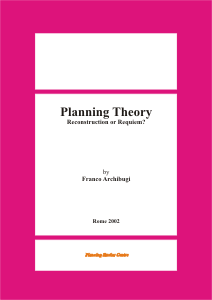|
 |
PLANNING THEORY
Reconstruction or
Requiem?
by Franco Archibugi
Planning
Studies Centre - 2002

|
The book expresses a sound unease about the direction taken by the
current analysis and criticism of planning experiences, both in the
field of economics and of urban and regional planning.
Instead of seriously revising the technical-scientific shortcomings
marking the various flops of the planning experience in both fields,
academic debates and reflection have led to a kind of political
interpretation. On the basis of the hopelessness of improving the
governance of managerial and political planning initiatives,
planning theory has been reduced to a generic sociological debate on
planning itself; a debate which freezes planning as a permanently
declining engagement.
To oppose this, the present book aims at identifying the essential
guidelines of a re-launch of planning processes and techniques,
configuring a kind of neo-discipline. It builds upon a
multi-disciplinary integration (never seen and experimented with
until now) of economic, environmental and sociological approaches.
People can owe the cause of the suffered flops to the shortcoming of
this in the past.
In fact, according to the Author, urban and regional planning has
never seriously included the evaluation of available economic
resources. Such an evaluation is normally only practiced on at least
a national scale; hence multi-disciplinary integration should absorb
a kind of “programming approach” for economic planning (which urban
and regional planning are endowed with) of a type lacking in normal
economic policy.
Another critical book has been
dedicated by the author to the “programming approach”
[forthcoming]. In the present book the main purpose is to integrate
the evaluation of the economic constraints and compatibilities into
the traditional physical and environmental planning (normally
referred to by planning theory); an evaluation which is almost
always neglected and ignored. And so the book dedicates itself to
outlining these integrative procedures.
CONTENTS
Preface
Chapter 1
Planning theory: reconstruction or requiem?
1. A certain uneasiness about “planning theory”.
2. Have we improved the clarity of planning methodology?
3. What are the reasons for the deceiving development of planning
theory?
3.1 The equivocal case of the “substantive” side of planning theory
3.2 Expanding the scope too much
3.3 Expanding the terrain and the roots
3.4 The lack of relationship with “substantive” planning
4. Planning theory: general or not?
5. A vademecum for good planners’professional relations?
6. Deontology and epistemology of the profession
Chapter 2
In search of the integration: the past negative experience
1. Expectations and results from the integration of the planning
sciences
1.1
Macro-economic planning in Europe
1.2 Strategic management and planning in the public sector
1.3 Integrated regional planning
1.4 Integrated approach in academic journals
2. The bad course of the debate
3. Is a positive reconstruction of planning theory possible?
Chapter 3
Towards a new unified discipline of planning
1. The fields of activity
1.1 Physical planning
1.2
Macro-economic planning
1.3
Social planning
1.4 Development planning
1.5 Operational planning
2. The merits and limits of the trans-disciplinary approach
2.1
Merits
2.2 Limits
3. “Positivist”-type decision-making analysis
4. Social reality is subjective reality
5. “Voluntarist”-type decision-making analysis
6. A defect of approach or one of further elaboration?
Chapter 4
The first routes of the new discipline
1. Schemes of procedures for the preparation of plans and the
construction of suitable “accounting frames”
2. Schemes of the systemic interrelationship between plan levels
3. Institutional procedures of “plan bargaining” and preference
consultation systems
4. Information systems for planning and their management
5. Monitoring and plan evaluation systems
Chapter 5
Some Integrative Topics of the new Planning Discipline
1. Integration between (conventional) economic accounting system and
social accounting system
2. Integration between socio-economic planning (and related
accounting) and technological forecasting
3. Integration between socio-economic planning (and related
accounting) and physical (or territorial or environmental) planning
4. Integration between socio-economic (and physical) planning and
institutional organization and negotiation
5. Integration between socio-economic planning and institutional
public system and design
6. Concluding remarks: the “planological approach”
Chapter 6
Planning science: basic postulates and reference logical framework
1. From the planning “theory” to the planning “science”
2. A reference framework for planning science: some essential
postulates
2.1 Logical postulates
2.2 Field or delimitation postulates
3. The planning process
4. The planning system
4.1 The planning selection system
4.2 The planning implementation system
4.3 Functional and time interdependencies
5. Conclusions
Chapter 7
The future of national planning systems: some new steps
1. The concept of “national planning”
2. National planning in a systemic vision
3. What opportunities exist for systemic.type development of the
national planning?
3.1. The weight of the past
3.2. Strategic planning at the national scale
4. The american federal strategic planning: its effect on the
national planning future
5. From strategic planning to national economic programming: a
necessary step toward a systemic planning
6. Toward a scientific and professional approach to the systemic
planning
Chapter 8
Planning and plan evaluation: some well know and often neglected
pitfalls
1. Logical indeterminateness: “evaluation” versus “values”
2. Systemic disconnectedness
3. Strategic insurbodination
4. Self-referencing
5.
Sub-optimation
6. Bounded rationality
|